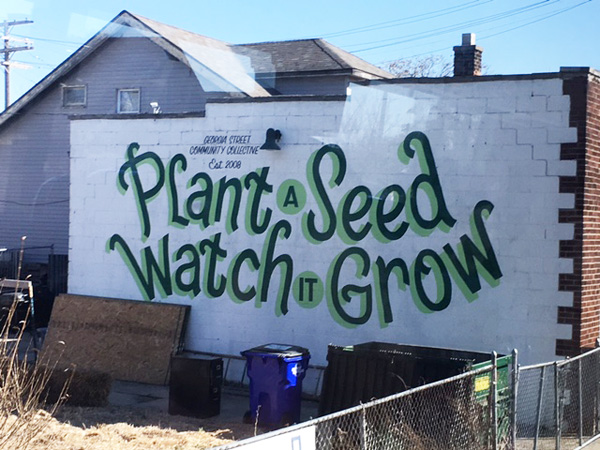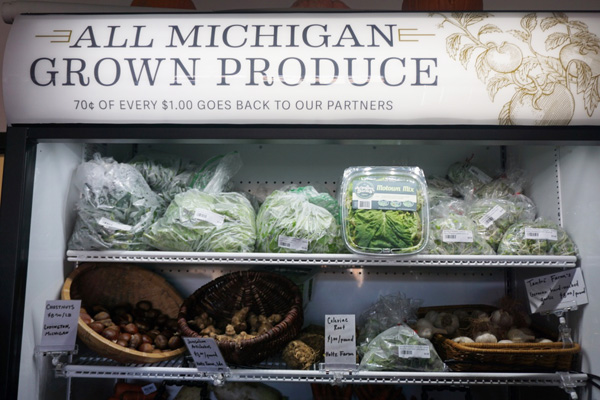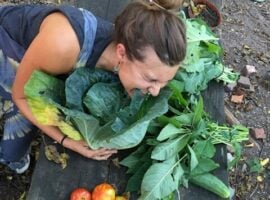The answer is, very. I came to this conclusion after a recent trip to Detroit, MI, also known as the “motor city.” I was there to attend the Detroit Food 2017 Summit and participate in WhyHunger’s Midwest Gathering of emergency food providers who came together to discuss the emergency food system and think about how we can collectively transform it to one that focuses on long-term solutions and is socially just, to truly end hunger. With that purpose in mind, learning about using narrative change as a strategy to achieve that transformation was a key activity. Narrative, or stories, influence our perspectives on every issue, including our view of hunger and poverty, and we hear them every day, be it through the media, friends, family, coworkers, books, etc. As we take in news we should think about the words used, how they were said, who is saying them and why.
Think about the stories you’ve heard of about Detroit. Now, what immediately comes to mind? Perhaps bankruptcy? Abandoned homes? Urban? Poor? Well, I’d like to help shift that narrative a bit by giving examples of a resilient community, thriving businesses, urban gardens and hope. Below, are the community-led organizations and businesses I got to learn a little about during my time in Detroit. Hopefully, even as short summaries, they leave you as inspired as I was.

Resident Mark Covington started The Georgia Street Community Collective (GSCC) in 2008. Originally, it was meant to be a beautification project but as they cleaned up the empty lots in the neighborhood Mark became inspired to start a community garden. He wanted to help the elders in the area who struggle to pay for both medicine and food, and empower the youth and provide them with structure. GSCC is achieving that by focusing on health, education, leadership skill development and protection to rebuild and sustain their community one house at a time. They offer school supply giveaways, holiday dinners, Easter egg hunts and more – all free to residents. They sell honey and eggs, and one of their goals is to have a fully functional greenhouse by next year. You can give a donation or learn more here.
Detroit Friends Potato Chips Co.

Located in Detroit’s Hope District, Detroit Friends Potato Chips. Co. is a wonderful example of a locally-grown, sustainable business that gives back. So wonderful in fact, that Oprah even knows about them! Detroit Friends is the brainchild of Michael Wimberley who wanted to renew his relationship with the earth and think about ways he could help fix Detroit’s economy by creating work and opportunity for those around him. Detroit Friends started growing potatoes on a vacant lot and soon realized making potato chips could be the right business model for them. Mike enrolled in a food lab business incubator, and after many tries and failed experiments; their potato chip was born. Their story caught attention of Oprah Winfrey and in 2016 they made it into Oprah’s Favorite Things list. Mike’s advice, “Be entrepreneurial, and never give up.” Detroit Friends gives back to the community by sourcing their Russet potato from a 3rd-generation farmer in MI and has become a community hub by having a soup kitchen and senior program. Order these delicious chips here, I personally recommend the Lemon Pepper flavor 🙂

Last, but certainly not least, is the woman-owned The Farmer’s Hand located in Detroit’s Corktown neighborhood. Founded by Rohani Foulkes and Kiki Louya, The Farmer’s Hand is part grocery, part café, and part farmers market that is dedicated to selling 100% locally grown and produced goods. As Kiki explained to us, they believe in growing agriculture in Michigan and helping farmers earn a living wage to create a better ecosystem. Developing personal relationships with farmers and telling their stories is essential, so people know where their food came from. They have over 100 different partners, 70 cents of each dollar goes directly back to their partners and they focus on providing seasonal, culturally appropriate foods. Check out their website to learn more and be sure to visit next time you’re in Detroit!
After reading a little about these community groups and organizations, I hope now when you hear “Detroit” you think about something different – the amazing people, thriving small businesses, food justice and self-determining communities. We should all think critically and evaluate the different narratives we hear and challenge ourselves to speak up or add new perspectives to conversations when we can.






